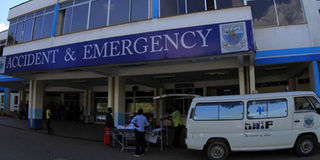Cancer patients cling on hope as drug runs out

Kenyatta National Hospital. The hospital ran out of breast cancer drugs two weeks ago. PHOTO | FILE | NATION MEDIA GROUP
What you need to know:
- Patients who receive the medication at intervals of three weeks said that they were not informed that the drug was not available until after seeing a doctor.
- According to David Makumi who chairs the Kenya Network of Cancer Organisations, the pattern of missing drugs is worrying because some patients default treatment after being turned away.
A group of patients on an expensive breast cancer drug have been forced to delay their treatment after Kenyatta National Hospital (KNH) ran out of the drug four weeks ago.
The 81 patients are now clinging onto hope after the Ministry of Health failed to honour its commitment to procure the drug that can cure early stages of the disease.
At least four patients were on Tuesday turned away from the hospital’s oncology pharmacy after being told that the drug known as Herceptin was still not available.
Mary* ((not her real name), travelled all night long, covering 482.1 km from Mombasa County for her monthly treatment only to be turned away at the hospital’s pharmacy.
“I came in very early, hoping that today the medicine will be available. To my dismay, the pharmacist told me that it was still not there,” said Mary who did not want to be named for fear of victimisation.
RECEIVE MEDICATION
The patients who receive the medication at intervals of three weeks said that they were not informed that the drug was not available until after seeing a doctor.
“The doctor reviewed us and prescribed the medication. I do not think they even knew that it was yet to be stocked,” added the patient.
The four are part of a programme called the Herceptin Access programme started in 2016 by the Ministry of Health in partnership with a Swiss pharmaceutical company, Roche, to supply the drug known as Herceptin for free at KNH.
In a co-funding Memorandum of Understanding (MoU) signed in May last year, the ministry was to foot 50 per cent of the cost and Roche the other half. Otherwise, patients would have to pay Sh250,000 for a dose, with a patient requiring at least 18 doses for treatment, a regimen that would cost close to Sh4.5 million.
The deal made the drug accessible and issuable in a public facility for the first time in the country.
ACCESS TREATMENT
When the programme, designed to help patients access treatment at a subsidised rate was launched, about 20 patients were enrolled.
The number later was increased to 81, after the Swiss firm sweetened the deal by taking up the larger chunk of the cost of the drugs by agreeing to pay 60 per cent as the Health ministry paid only 40 per cent of the cost, —which is about Sh80,959 ($800)—for every dose of Herceptin.
“Over time, and in agreement, we raised the number of patients because the government showed us some goodwill by paying for the first and second batch of the drugs on time,” said a source privy to the deal.
“When a patient is diagnosed and put on treatment early enough, her condition improves. However, if the drug is administered intermittently and based on government’s willingness to pay, then it is equivalent to delaying death in these patients,” noted the source who spoke on condition of anonymity.
But the ministry has been accused of failing to honour its end of the bargain, with sources privy to the matter adding that it has even gone ahead to threaten to pull out of the programme.
GAMBLE WITH LIFE
“The last time the ministry paid for the drugs was October last year and what they paid for has run out,” said a source privy to the negotiations.
Meanwhile, patients like 50-year-old Josephine Kamwenza have to gamble with their life, traveling from far-flung areas like to KNH without any reassurance of availability of the drug.
On two occasions, she has been compelled to postpone her treatment and travel back to Kitui, hoping that the drug will be available on the next appointment.
“I wish they can honour their word. I wish the hospital can also tell us on time that the drug is not available,” said Ms Kamwenza who underwent surgery to remove one of her breasts after being diagnosed with cancer in 2016.
According to David Makumi who chairs the Kenya Network of Cancer Organisations, the pattern of missing drugs is worrying because some patients default treatment after being turned away.
SIX CYCLES
For Mr Makumi, an ideal and sustainable situation would be one where the National Insurance Hospital Fund (NHIF) is given the mandate to pay for what he termed as the standard of care.
As it is, NHIF only covers between four and six cycles out of the 18, meaning that if the ministry does not release the funds, the patient will miss the treatment.
“Cancer is not like malaria where one type of treatment cures the disease. If you cannot cater for the full treatment, you would rather do without it,” he said.





